- Home
- Jack Canfield
Chicken Soup for the Soul Christmas Page 8
Chicken Soup for the Soul Christmas Read online
Page 8
To do so would be a great disgrace.
Grandma’s reluctance to remove her shoes convinced the teacher of her guilt. Miss Peabody marched Grandma off to the principal’s office. Grandma, in tears, immediately telephoned Grandpa, who rushed down to the school. Grandpa explained to the principal why his wife was reluctant to remove her shoes.
The understanding principal then allowed Grandma to remove her shoes in the privacy of his office. He soon discovered the only thing Grandma was hiding was a pair of unsightly, tattered stockings.
Grandma returned to her classroom, but all that day a shadow of suspicion hung over her.
Late that afternoon, just before the dismissal bell, Grandma was completely exonerated of any wrongdoing.
When her teacher, Miss Peabody, raised her right arm to write the class assignment on the blackboard, the missing coin fell from the cuff of her sleeve and rolled across the room in plain view of the entire classroom. Earlier that day, when the teacher had counted up the money, the stiffly starched cuff of her dress had accidentally scooped up the small coin.
That afternoon, when Grandma returned home from school, Papa was waiting for her on the front porch swing.
Exhausted from his night job, he was quietly napping.
Cradled in his hardworking hands was Grandma’s darning basket. Inside the basket were all of Grandma’s old stockings that Grandpa had carefully and lovingly mended.
In later years, Grandpa prospered as a a successful businessman. He took special pride in giving his wife stockings made from the finest silks and woolens. Though Grandma appreciated these fine gifts, she often said they were never so dear to her, or so well loved, as those old tattered stockings, so lovingly mended by her husband’s calloused, hardworking hands.
Cookie Curci
Papa’s Radio
From home to home, and
heart to heart, from one place to another.
The warmth and joy of Christmas
brings us closer to each other.
Emily Matthews
As a young Italian-American, my childhood was filled with stories that boasted colorful characters, lively dialogue, and wonderful settings. But, best of all, each story taught me a valuable lesson. Children’s storybooks, you say? No. Although I did my share of reading fanciful, illustrated fairy tales and nursery rhymes, the stories that filled my childhood were not written down. They were spoken.
Night after night, as I lay in bed with a soft, hand-stitched quilt drawn up under my chin, I listened in the dark as my mother, my father, a grandparent, a visiting uncle, or an older cousin would fill the nighttime silence with stories of life in the old country—Italy. Or even tell stories of life in the new country—America.
I loved these family tales. Each one gave me a clearer picture of my ancestors or a better understanding of the relatives I already knew. One of my favorite nighttime stories was of Grandpa and his beloved radio, and how it helped him learn the real meaning of friendship.
Papa Vincenzo nestled comfortably into his rocker and, with a twist of his hand, clicked on the dial of his brand-new RCA Victor radio. It was Papa’s habit each night, after one of Mama Saveria’s robust Italian meals, to position himself by his beloved radio and tune in the nightly antics of radio characters: “Fibber McGee and Molly,” “Amos ’n Andy,” “Edgar Bergen and Charlie McCarthy,” and “The Lone Ranger.”
There were no complexities to Papa Vincenzo’s lifestyle; his needs were easily satisfied by a good meal, a warm home, and a loving family. He lived his life by the simple and old-fashioned creed: “Pray for the things you want; work for the things you need.”
If Papa had one luxury, it was the acquisition of a household radio. The radio had become a vital component of his daily life. It restored his energy and brought back his sense of humor after a long workday in the fruit orchards of the Santa Clara Valley. With the impending arrival of World War II, the economy had begun to tighten, but my budget-wise Grandpa had managed to scrimp and save enough money from his meager earnings as a tree pruner to purchase the new radio. Although Papa had known poverty in the Old Country, he felt he’d never been poor, only broke. Being poor, Papa believed, was a state of mind; being broke was only a temporary situation.
Papa loved his new radio, but Grandma preferred listening to her old Victrola or puttering around her wood stove to sitting by the radio—until the day she heard her first episode of “One Man’s Family” on NBC radio. From that moment on, she was an ardent fan of the new media.
In time, Grandma came to believe the radio had been sent to them as a blessing. It helped both her and Papa Vincenzo to learn better English, and it boosted their social life as well. The radio gave them a common topic to discuss with their neighbors, who also listened nightly to the same radio programs.
On warm summer nights, Papa’s neighborhood cronies, Mr. Goldstein, Mr. Miller, and Mr. Rosenberg, sat with Papa on his front stoop, discussing their favorite radio programs. There were times when Mr. Goldstein explained the meaning of a certain Yiddish word Papa had heard on the “Molly Goldberg Show.” Other times, Papa translated a Puccini opera for Mr. Goldstein. Some nights, the old friends had a good laugh at the expense of the contestants on “Major Bowes’ Original Amateur Hour.” The radio helped to bond these old friends, who came from vastly different backgrounds, in a way few things could.
The men had left their Old Country to escape tyranny and oppression, and as young immigrants they had settled into the neighborhood together. Although they came from varied parts of the world and followed different religious beliefs, the old friends shared a love for their new country and family traditions.
And so their friendship grew—until that fateful December day in 1941, when Papa’s radio brought him the terrible news that Pearl Harbor had been attacked. He would hear President Roosevelt declare war with Japan and the Axis powers, Germany and Italy. It was a declaration of war that changed Papa’s life.
The knock on Papa’s door came early that December morning in 1941. It brought with it a special-delivery letter from the government of the United States declaring that Papa must surrender all radios on his premises—effective immediately!
Papa Vincenzo had no political ties to his former country.
He had worked and lived in America for more than thirty years and raised his children and grandchildren as honest, hardworking American citizens. But the fact remained that he was a native of Italy, a country now ruled by the fascist tyrant Benito Mussolini, who chose to side with the Axis powers against the United States.
As Papa read the dispatch, tears of indignation rolled down his face. Losing his radio would be sad enough, but Papa was more concerned that he might lose the company and respect of his friends in the community, which he had earned for more than thirty years.
More than anything else, Papa prided himself on his honest and high moral character. He was a man of his word. Now he feared that a war thousands of miles away had cast a shadow of aspersions over him. It appeared Papa’s fears were well-founded; some of his employers, leery of Italian aliens, started canceling their job offers.
Papa worried that his longtime friendship with the Goldsteins, the Rosenbergs, and the Millers was also in jeopardy. Would they also view him differently now?
Could they somehow believe he shared the same political views and beliefs as the terrible tyrant Mussolini?
That Christmas Eve, in 1941, Papa and Grandma sat quietly in their favorite chairs, warming themselves by the fire. Papa couldn’t help but miss the raucous sounds of his radio, and the daily banter with his friends and neighbors, which he feared he had now lost.
A knock on the door brought Papa quickly to his feet.
He approached his front door with trepidation. Opening the door, Papa was relieved and surprised to find the warm familiar faces of his old pals standing on his front stoop.
Mr. Goldstein was the first to speak up. “Vincenzo, my friend, the United States government says that you can no lo
nger own a radio. Is this correct?”
Wearing a quizzical expression on his face, Papa answered, “Yes—yes, this is so.”
“But the government did not forbid you should listen to the radio, correct?” inquired Mr. Rosenberg.
“Correct,” Papa repeated.
Papa’s neighbors handed him a sheet of paper, on which was written a handwritten time schedule listing all of his favorite radio programs. Each program and time corresponded with a neighbor’s address. His old pals had gotten together and worked out a radio listening schedule for Papa and Grandma that included every show from “The Goldbergs” to “Little Orphan Annie.”
“Read it, my friend,” encouraged Mr. Rosenberg. “It’s all there. On Monday, you and the missus will listen to ‘Fibber McGee and Molly’ at the Millers’ home; on Tuesday, ‘The Goldbergs’ and ‘Major Bowes Show’ at my house; on Wednesday, ‘Edgar Bergen and Charlie McCarthy’ at the Smiths’ house, and so on, until all of your favorite programs are accounted for. You and the missus won’t miss one of your favorite shows if we can help it, Vincenzo.”
Papa’s eyes welled with tears, but this time they were tears of joy and gratitude. Papa invited his dear friends into his house to celebrate the occasion. While Papa poured a glass of his homemade red wine for each of his friends, Grandma passed around her freshly baked biscotti.
Before going to bed that night, Papa and Grandma said a special silent prayer of thanks. Papa had lost his valuable radio on that somber day in 1941, but what he’d found in friendship on that very special Christmas Eve was truly priceless.
The great Chinese philosopher Lao Tzu wrote, “Kindness in words creates confidence, kindness in thinking creates profoundness, but kindness in sharing creates love.”
Cookie Curci
Elvis Was Wrong!
My lip quivered as I heard Elvis croon “I’ll Be Home for Christmas” on the car radio. Christmas was two weeks away, and this year my husband and I would be spending it alone. In August, the military sent my daughter and her husband, along with my two grandchildren, to a Navy base in Japan to serve our country. We had always shared Christmas with them, but this year our house would be empty. No one was coming home for Christmas, and I was miserable.
This was the daughter who had made me cry when I found out I was pregnant again. I fussed, fumed, and ranted at my fate. I had just given birth three months earlier to her brother, and I didn’t think I was ready for another child so soon.
Nine months later, a blonde-haired girl with blue eyes the size of saucers stole my heart. Over the years, we forged a bond tighter than Super Glue. Every year on her birthday, I thanked God for my gift.
Now, she was temporarily gone from my life. Every day was hard, and the Christmas season was excruciating.
Lights, gifts, family love—they all reminded me of my daughter. Her smile lit up a room, her gift of generosity was boundless, and her love for her family and friends was immense. I missed her so much that my heart ached.
Earlier that day, my husband had phoned me at work to make sure I was coming straight home.
“Gotta get that tree tonight. Only two weeks left,” he stated solemnly.
“Sure thing, babe.We’ll go tonight,” I said, halfheartedly.
Bah, humbug! I thought. I didn’t want a tree or presents or lights or anything that reminded me I wasn’t going to share Christmas with my daughter. That night after work, I pulled into our garage and trudged into the house.
“Hi, honey, I’m home!” I yelled.
There was no answer. As I walked through the hall, I noticed a glow coming from the living room. I stepped into the room to see a fully decorated Christmas tree standing in the far corner. Sitting on the floor in front of the tree was my daughter and her family.
“Merry Christmas!” they all yelled in unison. On the couch sat my husband, grinning from ear to ear, enjoying his part in pulling off the coup.
“You didn’t think I’d miss Christmas with you, did you, Mom?” she said, jumping up to give me a giant hug. Those big blue eyes were bright with tears.
“This is the second best present ever,” I whispered, my voice choking with emotion. “The best gift was when you came into my life,” I said, squeezing her back.
The next moment I was engulfed in a group hug. The entire family joined in a heartwarming moment and a memory for many Christmases to come.
Sallie A. Rodman
A Christmas Moment
It was 1997. I sat at my dining-room table and wondered how I would ever get ready for Christmas. I was tired and weak, and every muscle and nerve in my body were screaming.
I looked out my window to see the sun shining and the grass still semigreen. It was already December 20, and this was Minnesota. We were wishing for snow!
Without getting up from my chair at home, I knew people all over the world were scurrying to finish their last-minute preparations for Christmas. And then there was me. I was just beginning to do what most people had already accomplished.
I decided right then that I would put my physical pain aside and treat myself to a little outing, even if I was behind in preparations. Christmas would still arrive.
After convincing my husband that his John Deere suspenders and dingy-looking cap were unacceptable at the theater, we headed to A Center for the Arts, our local art theater. We were treated to one of the finest hours of Christmas entertainment ever by Lance Johnson at the Mighty Wurlitzer.
The music swirled about me as he commanded the keys and the pedals to the sounds of trains, bells, drums, chimes, and music boxes. Memories flooded my soul as “Silent Night,” “The Birthday of a King,” and “White Christmas” were performed in all their splendor.
Shortly after we had taken our seats, an elderly gentleman with a cane sat down with some difficulty in the low and somewhat narrow theater seat ahead of us. I’d had difficulty myself. He removed his hat—like any gentleman would do—and then proceeded to eat his brown bag lunch, which he had brought with him. This was okay by me. I, too, needed a Diet Coke in my hand, even though I had gallantly resisted the powerful and tempting aroma of the theater popcorn.
His head, with a crown of white hair, began to bob in time to the beat of the music. Although I could not see his feet, I knew they were tapping also, as I saw his knee rising up and down in rhythm. I wondered about his own story. Who was this gentle old man who had come alone to treat himself to a bit of Christmas spirit? Where did he live? What were his memories? Was he married? Perhaps his wife was in a nursing home now, or perhaps she had passed away many Christmases ago. Where were his children or his grandchildren, and would they be joining him to celebrate the holidays?
I watched him eat his sandwich as he carefully wiped his mouth with his napkin, and I wondered how many miles he used to have to walk on his way to school. Did he farm or maintain a business—or perhaps he taught or preached? My thoughts danced in time to the music as I wondered if he had experienced the old-fashioned sleigh rides, or perhaps it was even his only means of getting to the small country church on Christmas Eve. I wondered if he had believed in Santa Claus as a child or had eaten hard Christmas candy and peanuts in the shell. I wondered if he had ever performed as Joseph at the manger in a Christmas play, a lowly shepherd guarding his flocks by night, or one of the wise men who were following the star and seeking the child.
The last song heralded from the Mighty Wurlitzer as it disappeared into the stage. The old man clapped his hands with appreciation of the performance, as we all did. Our hearts were filled with great joy!
The lights came on, and I watched him struggle to get out of the low, small theater seat. I struggled from the seat behind him and gently, but firmly took a hold of his arm and lifted as he rose to his feet. He turned to my husband, who was already standing in the aisle, and said, “Thank you.”
It occurred to me that he didn’t know that the little boost had come from me. And that’s the joy of Christmas— doing something for someone and not needing
acknowledgment for it or expecting something in return. Christmas truly arrived to the old man and me in that moment. The cards and the baking and the hurry-scurry melted into oblivion. The beauty, magic, and joy of the season were captured instead. I was now ready for Christmas. And I was five days early!
Glorianne Swenson
Christmas Lost—and Found
Christmas waves a magic wand over this world, and behold, everything is softer and more beautiful.
Norman Vincent Peale
I remember standing alone in the darkness and humidity on the rear balcony of our fourth-floor apartment, leaning on the railing. The faint odor of curry and jasmine drifted up as I gazed over the gently rustling palm trees toward the blackness of the Arabian Sea beyond. It was Christmas Eve 1960, and I was in Bombay, India, where my foreign-service family was stationed.
My two younger sisters and brother were excited—it was Christmas after all! But I was fifteen, and to me nothing was right. Christmas was my favorite holiday, but as much as I tried, I just couldn’t get into the spirit.
I brushed my sweaty hair from my forehead and looked around. Most people in Bombay did not celebrate Christmas. There were no outdoor displays in the neighborhood. No windows glowed with trees covered in multicolored lights. The downtown maze of narrow streets, bicycles, and people contained no department stores, and the crowded, one-room shops run by local merchants were never decorated. From the radio came only wavering Indian music, not the well-known songs of Christmas. And as for the heartwarming, happy-ending Christmas stories we now enjoy on television each year, well, television had not yet come to Bombay.
Turning around, I saw our “tree” in the living room behind me. We had one of the few artificial trees sold in Bombay. It was a skinny thing, its wire branches barely covered with shredded green cellophane. Even the decorations we had brought from the States couldn’t fill it out. It was a tree Charlie Brown would surely have appreciated.

 Chicken Soup for the Nurse's Soul: Second Dose
Chicken Soup for the Nurse's Soul: Second Dose Chicken Soup for the Ocean Lover's Soul
Chicken Soup for the Ocean Lover's Soul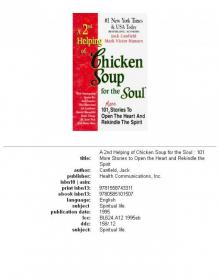 A 2nd Helping of Chicken Soup for the Soul
A 2nd Helping of Chicken Soup for the Soul Chicken Soup for the Nurse's Soul
Chicken Soup for the Nurse's Soul Chicken Soup for the Breast Cancer Survivor's Soul
Chicken Soup for the Breast Cancer Survivor's Soul Chicken Soup for the Pet Lover's Soul
Chicken Soup for the Pet Lover's Soul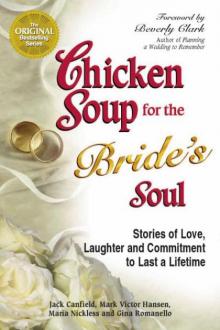 Chicken Soup for the Bride's Soul
Chicken Soup for the Bride's Soul A Chicken Soup for the Soul Christmas
A Chicken Soup for the Soul Christmas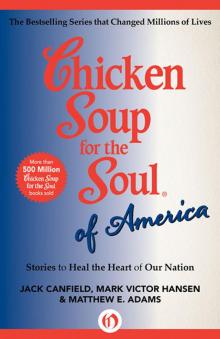 Chicken Soup for the Soul of America
Chicken Soup for the Soul of America Chicken Soup for the Teenage Soul on Tough Stuff
Chicken Soup for the Teenage Soul on Tough Stuff A Taste of Chicken Soup for the Teenage Soul III
A Taste of Chicken Soup for the Teenage Soul III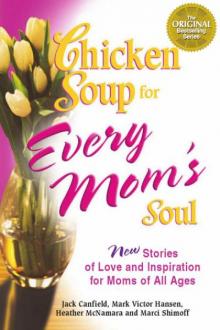 Chicken Soup for Every Mom's Soul
Chicken Soup for Every Mom's Soul Chicken Soup for the Dog Lover's Soul
Chicken Soup for the Dog Lover's Soul A Second Chicken Soup for the Woman's Soul
A Second Chicken Soup for the Woman's Soul Chicken Soup for the Soul the Book of Christmas Virtues
Chicken Soup for the Soul the Book of Christmas Virtues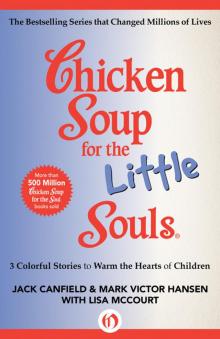 Chicken Soup for the Little Souls: 3 Colorful Stories to Warm the Hearts of Children
Chicken Soup for the Little Souls: 3 Colorful Stories to Warm the Hearts of Children Chicken Soup for the African American Woman's Soul
Chicken Soup for the African American Woman's Soul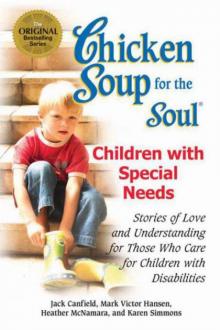 Chicken Soup for the Soul
Chicken Soup for the Soul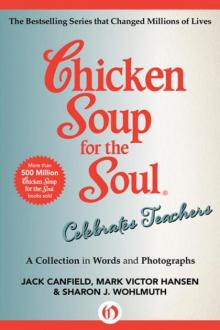 Chicken Soup for the Soul Celebrates Teachers
Chicken Soup for the Soul Celebrates Teachers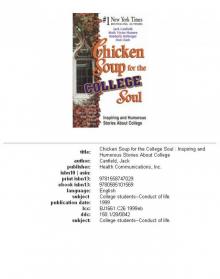 Chicken Soup for the College Soul
Chicken Soup for the College Soul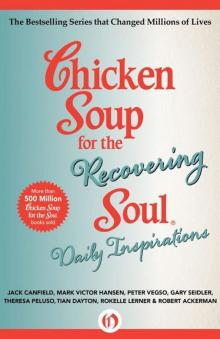 Chicken Soup for the Recovering Soul Daily Inspirations
Chicken Soup for the Recovering Soul Daily Inspirations Chicken Soup for the Soul Celebrates Sisters
Chicken Soup for the Soul Celebrates Sisters Chicken Soup for the Dieter's Soul
Chicken Soup for the Dieter's Soul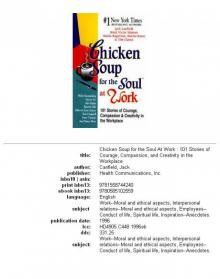 Chicken Soup for the Soul at Work 101 Stories of Courage
Chicken Soup for the Soul at Work 101 Stories of Courage Chicken Soup for the Beach Lover's Soul
Chicken Soup for the Beach Lover's Soul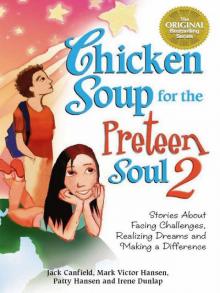 Stories About Facing Challenges, Realizing Dreams and Making a Difference
Stories About Facing Challenges, Realizing Dreams and Making a Difference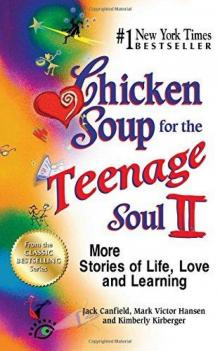 Chicken Soup for the Teenage Soul II
Chicken Soup for the Teenage Soul II Chicken Soup for the Girl's Soul
Chicken Soup for the Girl's Soul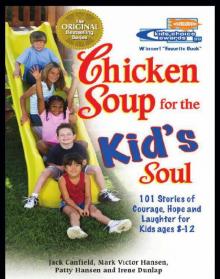 Chicken Soup for the Kid's Soul: 101 Stories of Courage, Hope and Laughter
Chicken Soup for the Kid's Soul: 101 Stories of Courage, Hope and Laughter Chicken Soup for the Woman's Soul
Chicken Soup for the Woman's Soul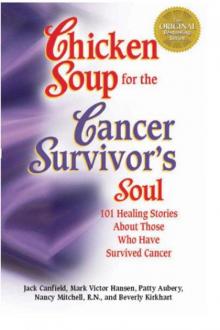 Chicken Soup for the Cancer Survivor's Soul
Chicken Soup for the Cancer Survivor's Soul Chicken Soup for the Canadian Soul
Chicken Soup for the Canadian Soul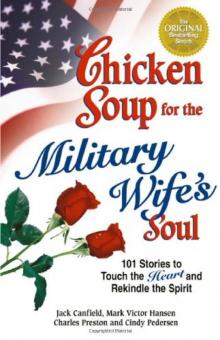 Chicken Soup for the Military Wife's Soul
Chicken Soup for the Military Wife's Soul A 4th Course of Chicken Soup for the Soul
A 4th Course of Chicken Soup for the Soul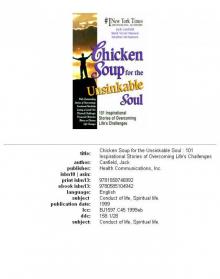 Chicken Soup Unsinkable Soul
Chicken Soup Unsinkable Soul Chicken Soup for the Soul: Christmas Magic
Chicken Soup for the Soul: Christmas Magic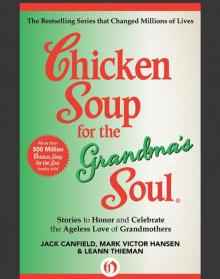 Chicken Soup for the Grandma's Soul
Chicken Soup for the Grandma's Soul Chicken Soup for the Soul: All Your Favorite Original Stories
Chicken Soup for the Soul: All Your Favorite Original Stories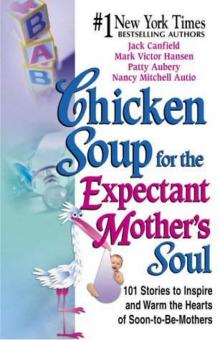 Chicken Soup for the Expectant Mother's Soul
Chicken Soup for the Expectant Mother's Soul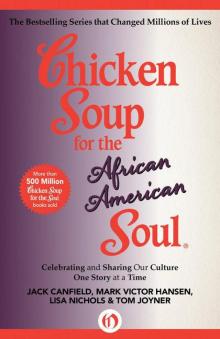 Chicken Soup for the African American Soul
Chicken Soup for the African American Soul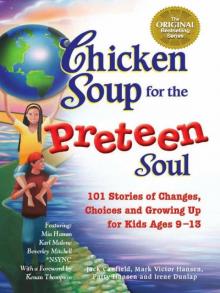 101 Stories of Changes, Choices and Growing Up for Kids Ages 9-13
101 Stories of Changes, Choices and Growing Up for Kids Ages 9-13 Christmas Magic
Christmas Magic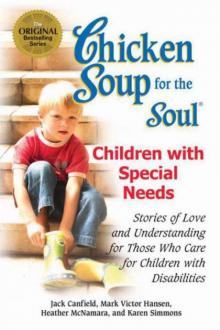 Chicken Soup for the Soul: Children with Special Needs
Chicken Soup for the Soul: Children with Special Needs Chicken Soup for the Soul: Country Music: The Inspirational Stories behind 101 of Your Favorite Country Songs
Chicken Soup for the Soul: Country Music: The Inspirational Stories behind 101 of Your Favorite Country Songs Chicken Soup for the Country Soul
Chicken Soup for the Country Soul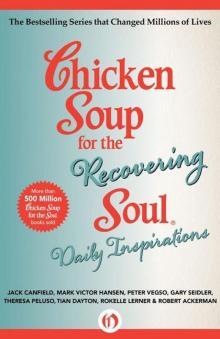 Chicken Soup for the Recovering Soul Daily Inspirations (Chicken Soup for the Soul)
Chicken Soup for the Recovering Soul Daily Inspirations (Chicken Soup for the Soul)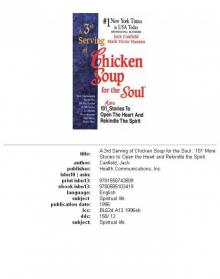 A 3rd Serving of Chicken Soup for the Soul
A 3rd Serving of Chicken Soup for the Soul The Book of Christmas Virtues
The Book of Christmas Virtues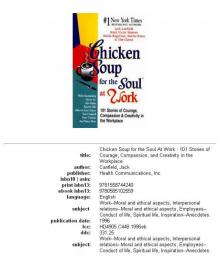 Chicken Soup for the Soul at Work
Chicken Soup for the Soul at Work Chicken Soup for the Soul 20th Anniversary Edition
Chicken Soup for the Soul 20th Anniversary Edition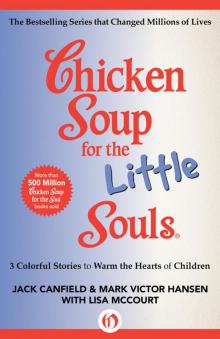 Chicken Soup for the Little Souls
Chicken Soup for the Little Souls Chicken Soup for the Soul: Reader's Choice 20th Anniversary Edition
Chicken Soup for the Soul: Reader's Choice 20th Anniversary Edition Chicken Soup for the Soul Christmas
Chicken Soup for the Soul Christmas Taste of Chicken Soup for the Teenage Soul III
Taste of Chicken Soup for the Teenage Soul III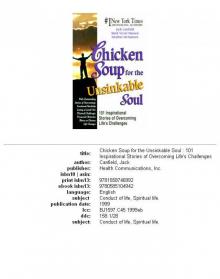 Chicken Soup for the Unsinkable Soul
Chicken Soup for the Unsinkable Soul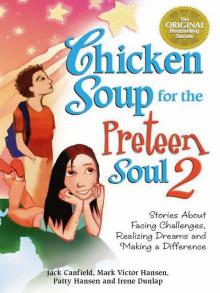 Chicken Soup for the Preteen Soul II
Chicken Soup for the Preteen Soul II